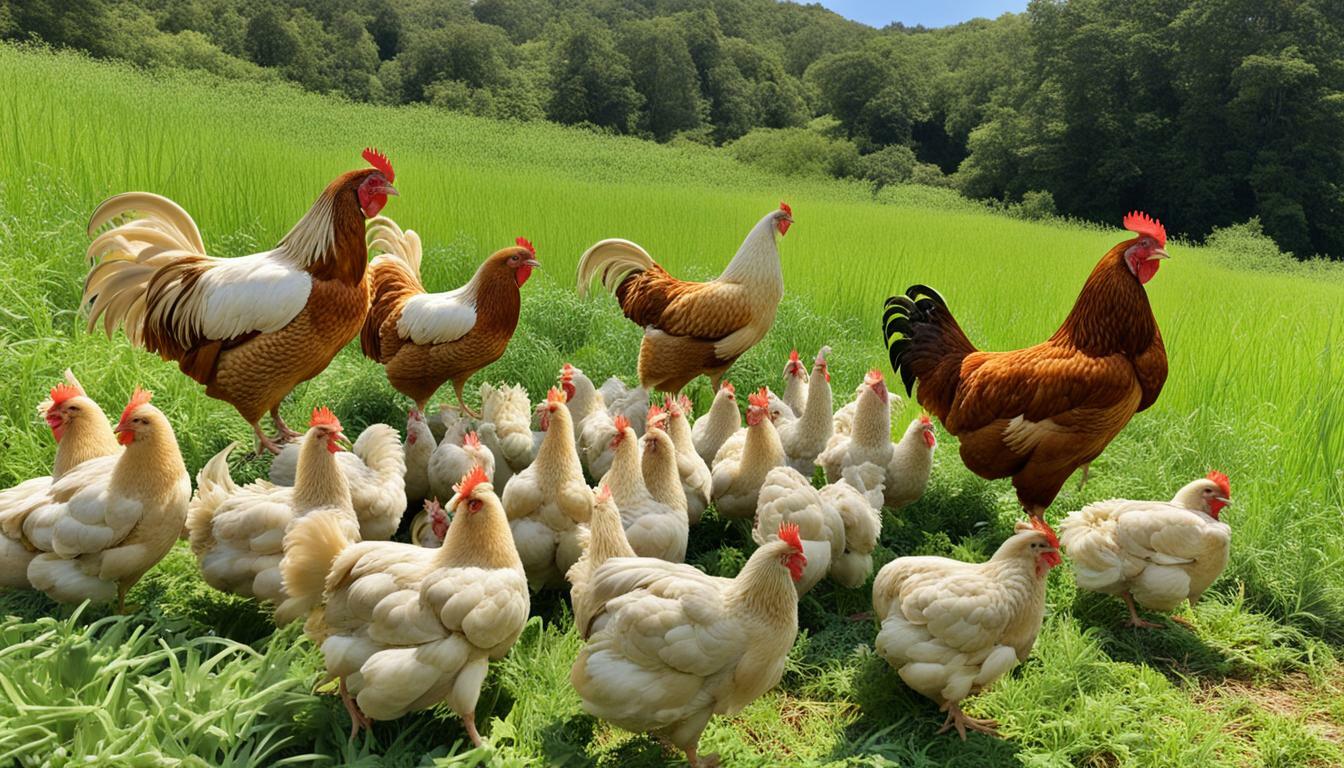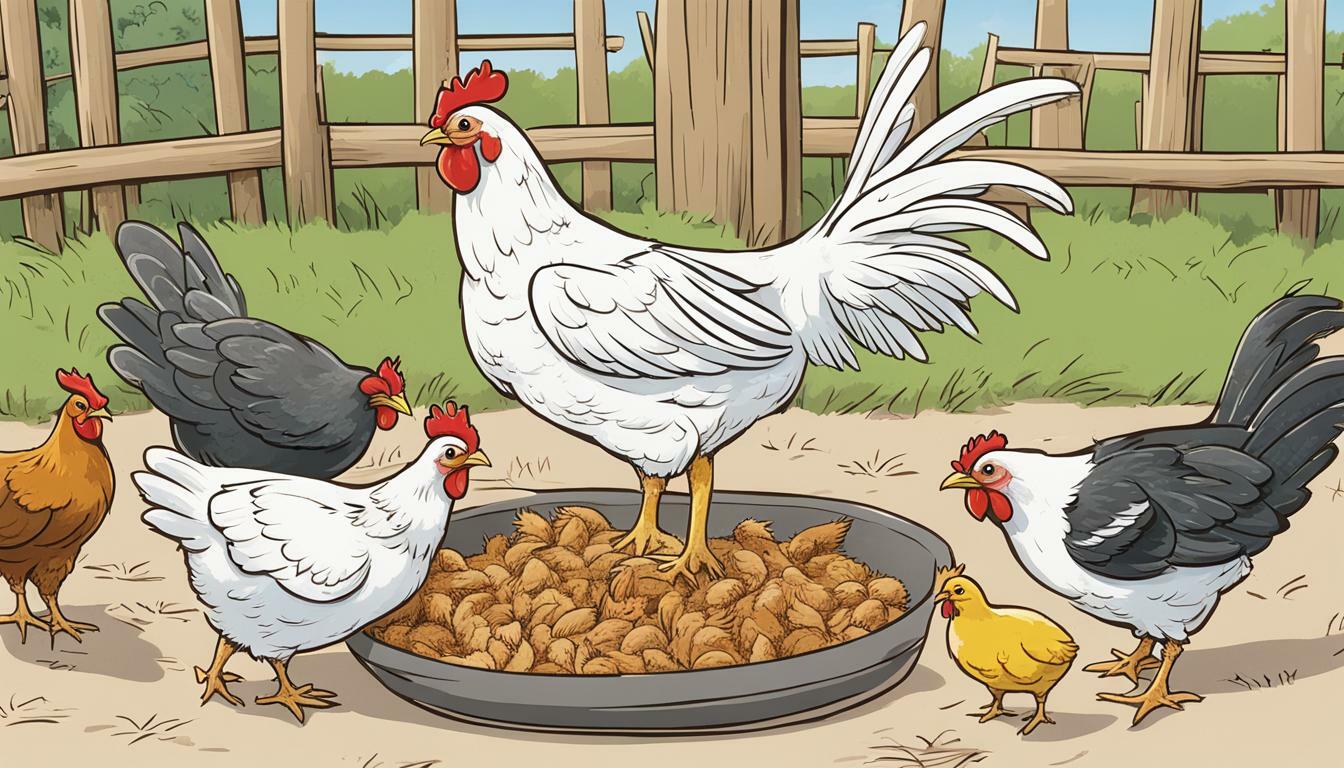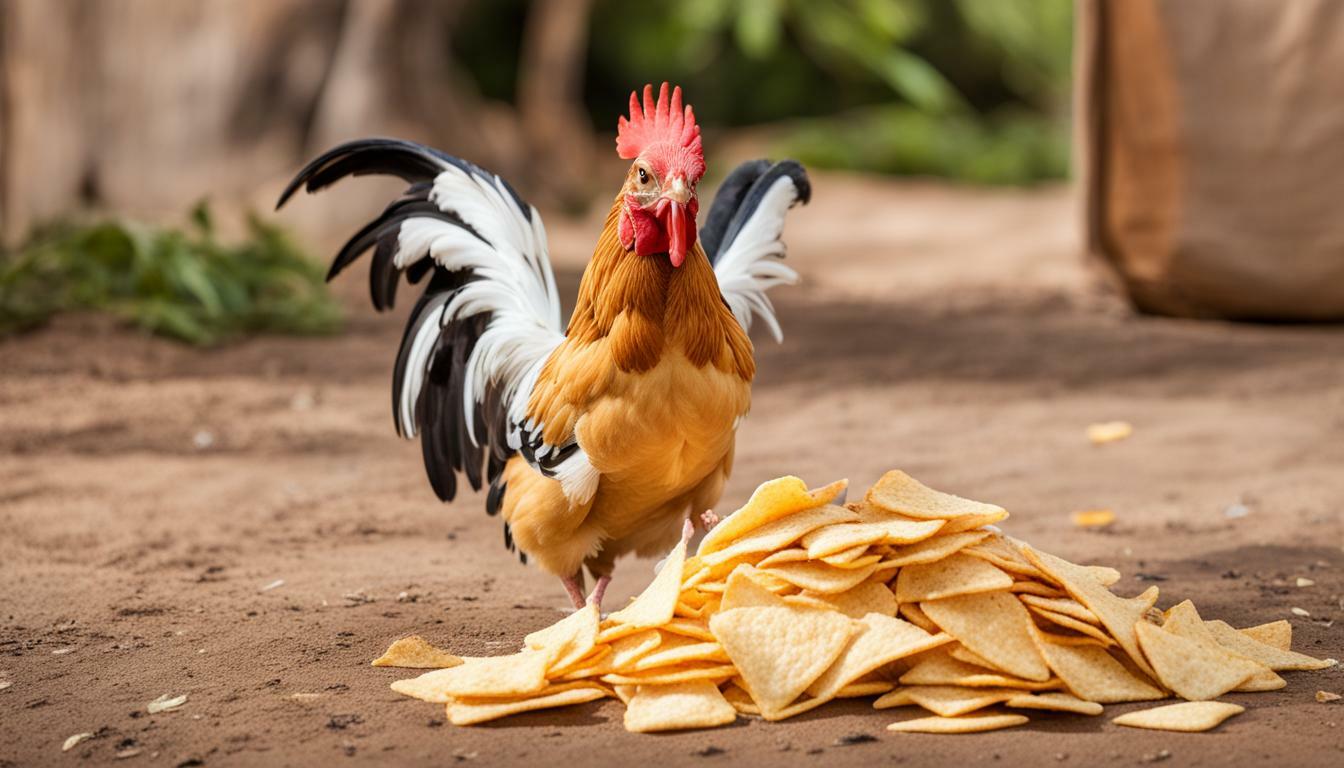Can Chickens Eat Melon? Nutrition And Feeding Tips
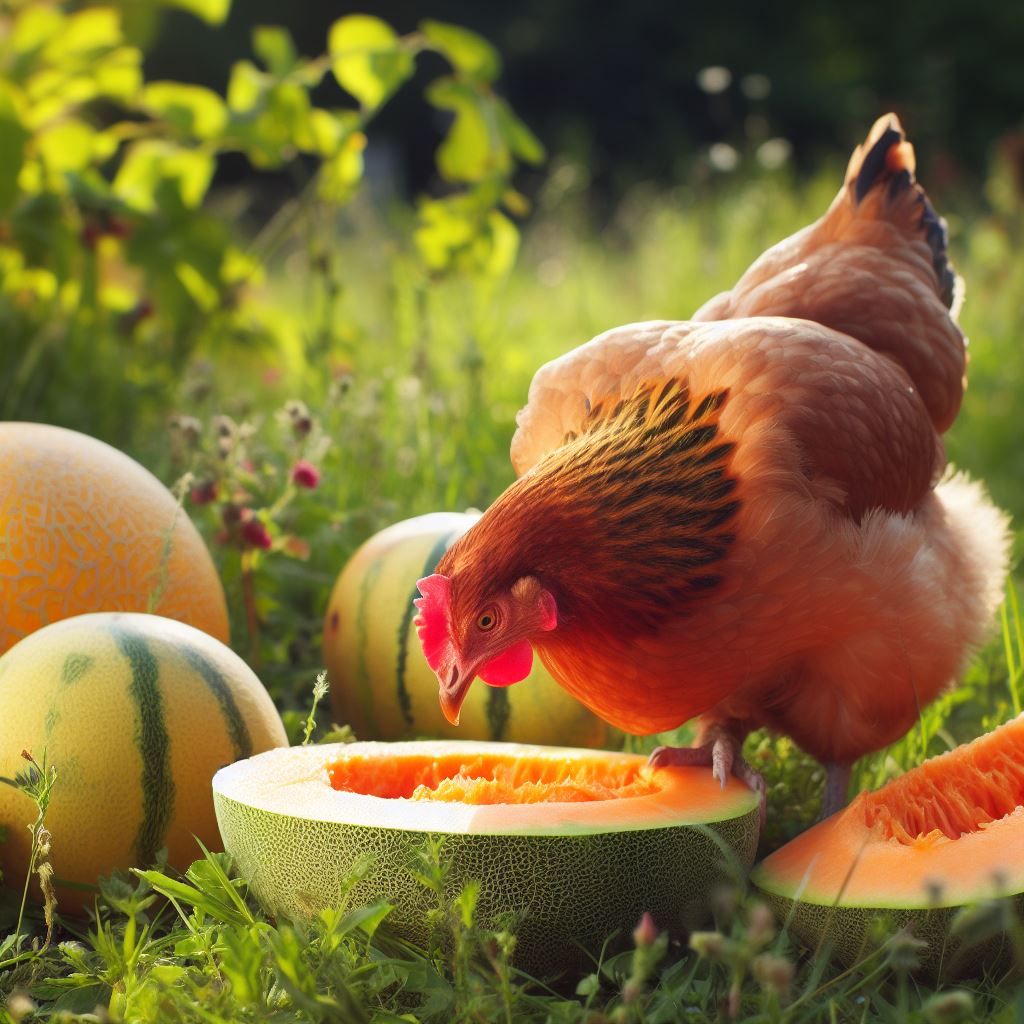
Table of content:
Can chickens eat melons? Chickens can safely eat some types of melons in moderation as an occasional treat. Melons provide vitamins, minerals, fiber, and hydration. However, too much melon can cause digestive issues. Feed chickens melon in limited quantities along with their regular diet.
Key Takeaways:
- Melons like watermelon, honeydew, and cantaloupe can be fed to chickens in small amounts.
- Melons provide nutrients like vitamins, minerals, and water.
- Too much melon can cause digestive upset and diarrhea.
- Feed chickens no more than a few cubes or slices 1-2 times per week.
- Always introduce new treats slowly.
- Remove rinds, seeds, and stems which can be choking hazards.
Chickens enjoy pecking at colorful fruits like juicy watermelon and cantaloupe. While melon should not be a staple of a chicken’s diet, it can provide a refreshing, hydrating treat during the hot summer months. Chickens that free range may even snack on wild melons growing in the garden.
This guide covers everything chicken owners need to know about feeding melon to chickens safely.
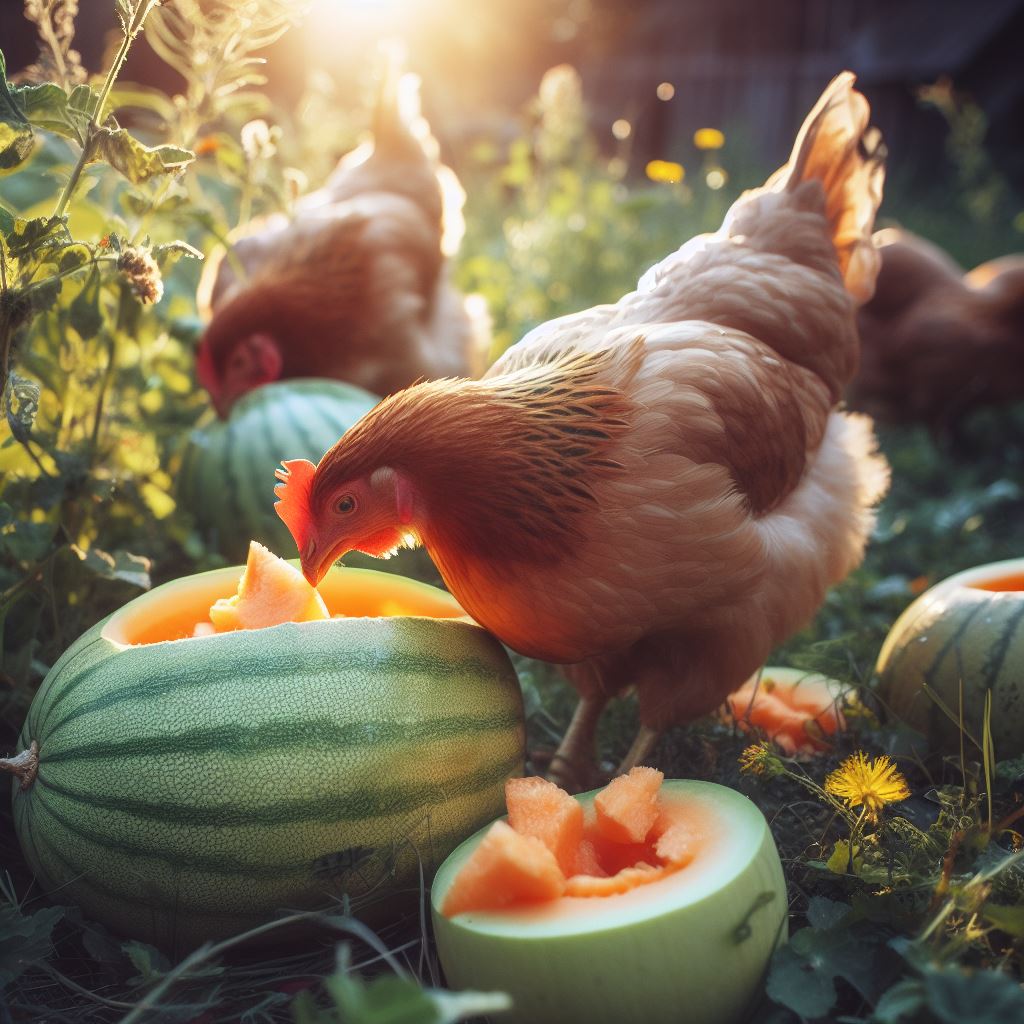 Can Chickens Eat Melon? Feeding Tips
Can Chickens Eat Melon? Feeding Tips
Chickens can eat some types of melons, specifically watermelon, honeydew and cantaloupe. Other melons like casaba and crenshaw are also safe for chickens.
Melons are part of the Cucurbitaceae plant family which includes cucumbers, squash, and pumpkins. These relatives are all safe and nutritious foods for backyard chickens.
While chickens can eat melon, it should only be fed in moderation 1-2 times per week at most. Too much melon can lead to loose droppings and diarrhea.
Watermelon
Watermelon is a favorite summer treat for chickens. The flesh provides hydration while the seeds give protein, fat, and fiber.
Feed chickens watermelon flesh, rind, and seeds but avoid the tough white peel which is hard to digest.
Cantaloupe
Like watermelon, cantaloupe offers hydration and nutrients. Cantaloupe contains high amounts of Vitamin A and C.
The soft orange flesh is safe for chickens but avoid the rind of cantaloupe which is tougher. Remove any pits or seeds before feeding as they can pose a choking risk.
Honeydew
The sweet juicy flesh of honeydew melon is enjoyed by chickens. Honeydew provides hydration and antioxidants like Vitamin C.
Scoop out the soft green flesh to feed to chickens. Avoid honeydew rind which can cause crop impaction. Remove peel, seeds, and stems.
Nutrition Facts
Melons are nutritious treats that provide:
- Water – Hydrates chickens
- Vitamin A – Supports immune health
- Vitamin C – Boosts immunity
- Potassium – Important electrolyte
- Fiber – Aids digestion
Unlike fruits high in sugar like grapes or bananas, melons offer a lower sugar content. One cup of diced watermelon contains around 11 grams of sugar.
Melons also provide small amounts of calcium, iron, and B Vitamins.
| Nutrient | Benefits |
|---|---|
| Vitamin A | Immune health, vision |
| Vitamin C | Immunity boosting antioxidant |
| Potassium | Essential electrolyte |
| Magnesium | Bone health |
| Fiber | Digestive health |
The high water content in melon flesh provides hydration on hot days. This helps prevent chickens from overheating.
Melon seeds are also nutritious, providing protein, healthy fats, minerals like magnesium and phosphorus, and fiber.
While melons offer useful nutrition for chickens, they do not provide enough protein, calcium or other nutrients to form a complete diet. They should be fed as supplements to a balanced feed.
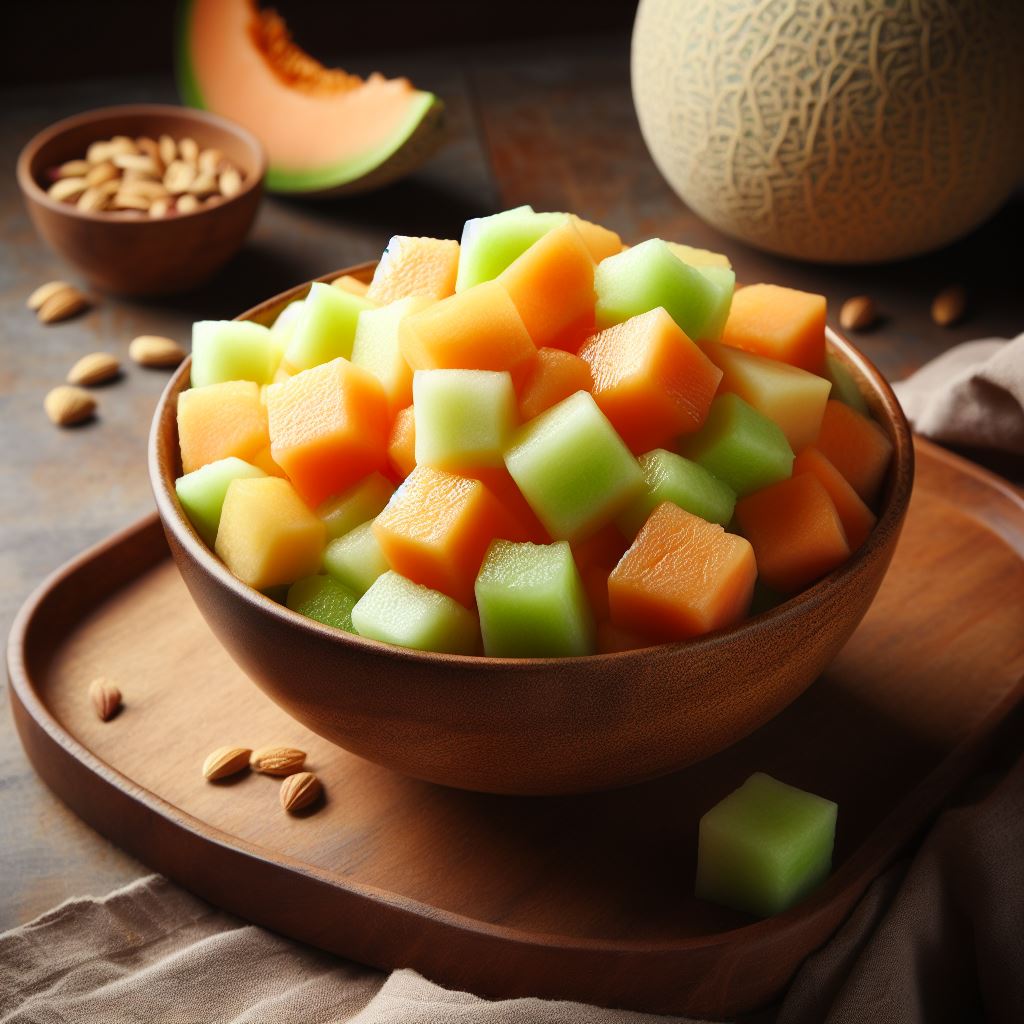 Feeding Melon to Chickens
Feeding Melon to Chickens
Melons should be fed to chickens in moderation as an occasional treat. Too much can lead to loose droppings or diarrhea.
Follow these tips for safely feeding melon to chickens:
- Start slow when introducing new treats.
- Limit treat feeding to 1-2 times per week.
- Feed melons in small quantities only.
- Remove rinds, seeds, stems and peels.
- Chop melon flesh into small cubes or slices.
- Provide melon as a supplement to complete feed.
- Ensure melons are fresh – discard moldy pieces.
- Wash melons to remove bacteria like Salmonella.
Chickens that free range may naturally nibble on fallen garden melons. This is safe as long as they are not gorging exclusively on melons.
How Much Melon to Feed
When feeding melon, moderation is key. Limit treats to no more than 1-2 times per week.
Do not allow chickens unlimited access to melon or make it a significant part of their diet.
For a flock of 4-6 chickens, provide:
- 2-3 slices of melon per chicken
- 1/2 cup of diced melon pieces per chicken
- 1-2 whole melon seeds per chicken
Remove treat if chickens ignore it to prevent spoiling.
Always supervise chickens when offering high-moisture treats like melon to prevent gorging.
Preparing Melon for Chickens
Melons should be prepped before feeding to chickens:
- Wash thoroughly under running water.
- Remove any damaged portions or moldy spots.
- Cut away tough outer rind, peel, and stem.
- Scoop out flesh and remove any pits or seeds.
- Dice melon into small cubes or slices.
- Mash larger pieces if feeding chicks.
These steps remove possible choking hazards from melons. Washing removes Salmonella and other bacteria that can cause illness.
Introducing Melon Slowly
Whenever introducing new treats, go slowly at first.
Start by feeding a few small bites of melon to each chicken. Watch to ensure the new food does not cause any digestive upset.
Wait 24 hours before feeding again. Slowly increase the amount provided over 2 weeks.
If any chicken shows signs of diarrhea, remove melon immediately and wait 1-2 weeks before trying again.
Dangers of Feeding Too Much Melon
While nutritious and hydrating in moderation, too much melon can be dangerous for chickens leading to:
- Loose droppings and diarrhea
- Dehydration
- Crop impaction
- Obesity if overfed
- Nutritional deficiencies long-term
Diarrhea causes loss of electrolytes like potassium and sodium which can be fatal in extreme cases.
Crop impaction occurs when fibrous rinds obstruct the crop. This requires emergency surgery.
Relying on melons long-term leads to malnutrition as chickens do not receive adequate protein, calcium or other nutrients.
Always feed melons in limited quantities as supplements to a complete feed. Free feeding can lead to over-consumption.
Diarrhea and Digestive Upset
The high moisture and sugar content of melons can loosen droppings if fed in excess.
Signs of diarrhea include:
- Loose, watery droppings
- Stained vent feathers
- Lethargy and fluffed feathers
- Decreased appetite
- Dehydration
Diarrhea leads to dangerous dehydration and electrolyte imbalances.
If diarrhea occurs, immediately remove melons and offer electrolyte supplements in water. Allow the digestive system to rest 24-48 hours before reintroducing melon slowly.
Dehydration
While melon provides hydration, too much can have the opposite effect.
Excess fructose from melon causes osmotic diarrhea which can rapidly dehydrate chickens.
Ensure fresh water is always available when feeding high moisture treats. Watch for signs of dehydration like lethargy, sunken eyes, dry mucous membranes, and thick saliva.
Dehydrated chickens may need oral or under-the-skin fluid injections to recover. Consult an avian vet if dehydration is severe.
Crop Impaction
The tough rinds of melons can become stuck in a chicken’s crop leading to a blockage called crop impaction.
Symptoms include:
- Lack of appetite
- Difficulty swallowing
- Crop distension
- Weight loss
- Leathered skin
Crop impaction requires surgery to clear the obstruction. Always remove rinds before feeding melons.
Obesity
While rare, chickens allowed to free feed on fallen melons may become obese.
Limit treats to avoid excessive weight gain which strains the cardiovascular system and joints.
Weigh chickens monthly and limit melon if any are overweight. Increase opportunities for exercise.
Alternatives to Melon for Chickens
For chickens that enjoy juicy fruit, some alternatives to melons include:
- Cucumber – Provides hydration. Can feed peel.
- Banana – High potassium. Feed ripe peels.
- Berries – Packed with antioxidants but limit due to sugar content.
- Apple – Moderate sugar levels. Can include peel.
- Orange – Vitamin C boost. Feed peeled.
- Tomato – More nutrition than melon with less sugar.
Offer a variety of fruits, veggies, leafy greens, sprouted grains, and treats like mealworms for a balanced diet.
Rotate options to prevent boredom and ensure chickens receive diverse vitamins and minerals.
FAQs
Can chickens eat cantaloupe?
Yes, chickens can eat cantaloupe. Scoop out the soft orange flesh to provide hydration and beta-carotene. Avoid the tough outer rind which can cause impaction.
Can you feed chickens watermelon rinds?
Chickens can eat small amounts of watermelon flesh, seeds, and rinds. But limit rind intake as the fiber and cellulose may cause crop impaction if overfed.
Do chickens like honeydew melon?
The sweet flavor and juicy flesh of honeydew melons attract chickens. Chickens will enjoy the hydration honeydew provides on hot summer days.
Are melon seeds bad for chickens?
No, melon seeds are safe and nutritious for chickens. They provide protein, healthy fats, minerals, and fiber. Limit portions to avoid overfeeding.
Can chickens eat melon everyday?
No, chickens should not eat melon daily. Melons are treats and should only comprise a small part of a chicken’s diet. Feed 1-2 times per week in limited portions.
Conclusion
Melon can be a refreshing, hydrating treat for chickens during warm weather. Chickens enjoy juicy watermelon, honeydew and cantaloupe.
Take care to feed melons in moderation – no more than twice weekly. Limit portion sizes to a few slices per chicken.
Prepare melons by removing rinds, stems, peels, and seeds which can pose choking hazards. Introduce new treats slowly watching for signs of digestive upset.
While providing useful nutrition, melons should only supplement a complete feed to ensure a balanced diet. Rotating a variety of fruits, veggies, and treats keeps backyard chickens happy and healthy.
Welcome. I’m Adreena Shanum, the proud owner of this website, and I am incredibly passionate about animals, especially poultry. I founded adreenapets.com as a labor of love, stemming from my desire to share my knowledge and experiences with poultry enthusiasts worldwide.


